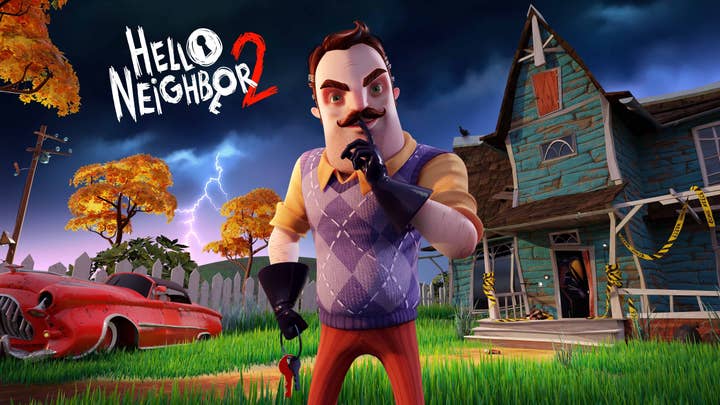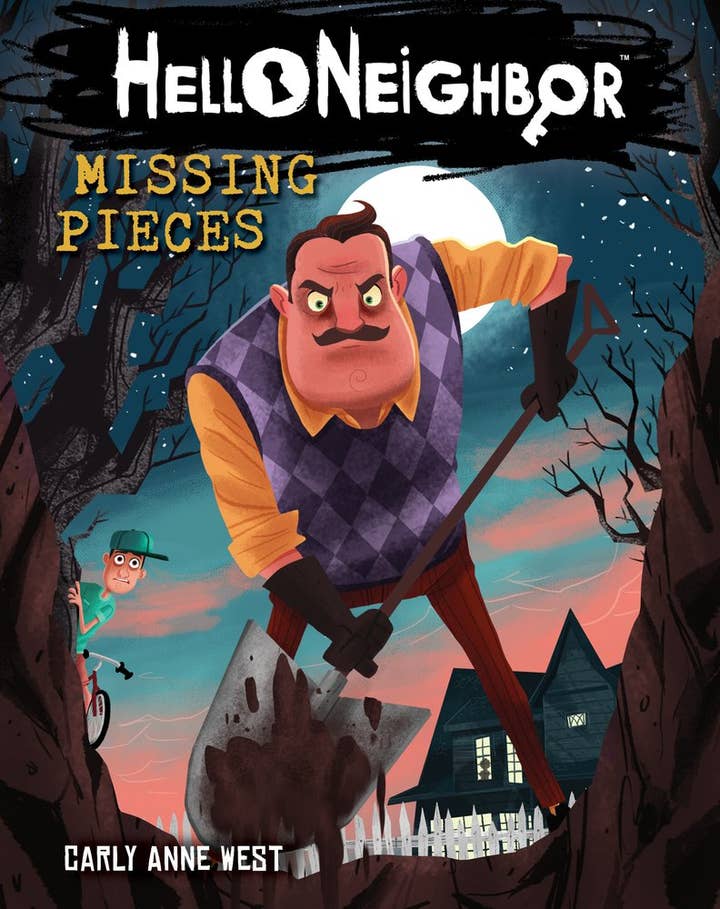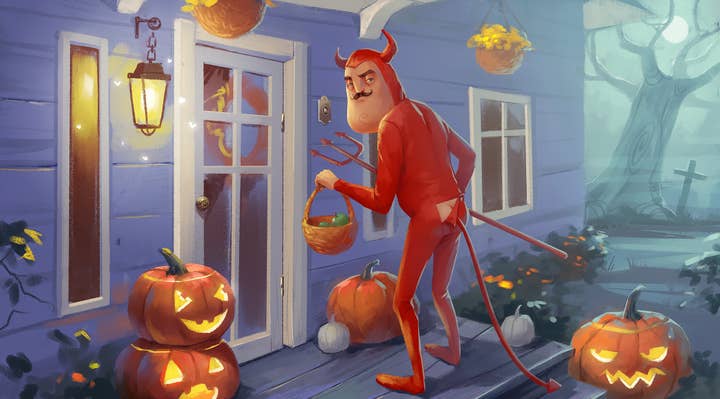Licensing lessons from Hello Neighbor's success
During GamesIndustry.biz's Changing Channels, Alex Nichiporchik gave pieces of advice and words of warning for developers tempted by a licensing adventure
Within three years, Hello Neighbor went from being an indie game released as a beta on Steam, to being downloaded 30 million times, becoming a hit franchise with a prequel and a spin-off, making $16 million in revenue with books, and racking up 11 million views in a week with a TV series test pilot.
The IP could be a poster child for how to do licensing right. But for publisher TinyBuild -- which acquired developer Dynamic Pixels earlier this year -- it was no bed of roses.
CEO Alex Nichiporchik discussed how the publisher transformed an indie horror game into a cross-media hit during our Changing Channels digital conference last week. And he started the discussion with a warning: "Without a great game, you have nothing."
"Without a great game, you have nothing"
Thankfully for TinyBuild, Hello Neighbor resonated with millions of gamers, so three studios and over 100 people are now working on the brand.
"If I look all the way back, it was a series of happy accidents that then turned into this train that started moving faster and faster," Nichiporchik said. "And then we just needed to put rails in front of it."
But before boarding this train, developers need to make sure their IP is ready, and that they understand what a licensing agreement can entail -- both topics Nichiporchik touched upon during his Changing Channels session, that you can re-watch below.
Licensing: where to start
Whether you're thinking about pitching your IP as a candidate to become a Funko Pops collectible, or have ambitious TV series plans, you need to make sure your brand is a viable candidate for licensing.
There are ways to measure success that will help you understand if your IP is ready to branch out -- and they're not necessarily the obvious ones. It's not the games industry that you need to convince, but the film industry or the toy industry, and they may have different ways to gauge what 'successful' means.
"It's not only about what level of success you have, but also how you show that success, how you can have someone verify that level of success," Nichiporchik said. "We get a lot of pitches and we'll have situations where people will go: 'Oh, we have this many people in our Discord.' And we know that having a Discord channel is really great, [but] someone in Hollywood will probably not even know what that is. And, even worse, would not be able to verify that."
"Focus on something that is trackable, something that you can definitely say: here's why our game is popular"
Another example would be using Steam reviews as a metric for popularity -- while this may be enough in the games industry, external partners often won't see it as valuable.
"How often do you go to a Steam page and the top review, even if it's all great, is just a terrible meme? So I think it's really important to figure out: how do you judge your metric of success? And how can you prove it, and then focus on those things? For Hello Neighbor, it was YouTube. With YouTube you can easily track the number of views that you have. You search for Hello Neighbor and you can easily see that the game has billions and billions of views."
Nichiporchik said many developers wrongly focus on getting coverage, when they should instead build their own communities and use it as leverage to approach other mediums.
"Focus on something that is trackable, something that you can definitely say: we had this many views in this amount of time, here's why our game is popular, here's why you should consider it. Versus going into download numbers or anything -- that becomes a little bit too iffy, especially with the mobile segment, where companies claim that they have tens of millions of players, but they spent millions on marketing."

If your goal is to go cross-media, Nichiporchik broke down the kickstarting process into three steps:
- Identify where your target audience is
- Figure out a way you can track the stats surrounding that
- Focus on building out those KPIs
"You need to build a community that follows you and is also hungry for more content in different mediums," he continued. "That makes any investment decision [for] a movie or TV production or books much easier, because they understand that there is an install base that they can leverage, to kickstart their production and then expand.
"Start by asking someone with previous experience and established contacts for intros. Or figure out if you can partner up with someone like us -- or there are many other great publishers out there that may have similar contacts."
What you should look out for

If, luckily, your IP is strong enough to support branching out in another medium, or have its own line of toys, you'll need to be extra careful as licensing agreements can be a challenge to navigate.
Working with a trusted partner may be the best way forward, Nichiporchik advised.
"Especially if we talk about the indie space, it's really important to maintain creative control, or work with people that you trust for creative control in the medium that they specialise in.
"We trust our licensing agents to read the fine prints and then figure out the rights that we're actually signing up. We never go exclusive, as a rule of thumb. It's either a limited time exclusivity or just non-exclusive, so that multiple companies can make merchandising or something else."
But if you don't have the chance to work with a partner that can help you with the small print -- which was the case for Hello Neighbor initially -- here are a few elements that you should look out for.
- Losing control over parts of the IP
Nichiporchik pointed out that it's easy to think: the IP belongs to me, so what problem can there possibly be? But there are many subtleties in licensing contracts that mean parts of the IP may escape your control.
"There were a couple of situations where, if we weren't diligent enough, we would have missed very important points in the licensing agreement that would prevent us from doing things in the future. And specifically, if we talk about cross-media and narrative entertainment, it's very important to understand what kind of rights you're locking in.
"It just blows my mind on how messy those rights can get"
"For example, you made a game and I want to make a TV show based on it. The contract will most likely try and put something in as to, if I make a character that is new to the universe in my spin-off medium, even though the IP is yours, then I own that character in perpetuity for any other mediums.
"This happens all the time. This actually is one of the main reasons why we decided to self fund the production of the pilot for the anime show. We have the writer from the books that worked on that, and we essentially produced the whole thing internally. We spent a lot of time stepping on known landmines that we could have avoided if we had actual professionals in the field working on this.
"Coming back to my example with characters, how messed up is it that I want to make a TV show based on your game and I'm actually incentivised to write whole new characters? I can then benefit from them in the long run. I'm not incentivised to tell the original stories. It just blows my mind on how messy those rights can get."

- Timed rights
Another aspect you should watch out for is adaptation rights that eventually run out. Whether it's film or TV, rights may be timed and if the result is not to your liking at that point, there's nothing you can do.
"There was an example in the 90s of a Fantastic Four movie that was absolutely terrible," Nichiporchik said. "And people go: 'Oh okay, well, comic book movies were bad in the 90s.'
"[But] whoever owned Fantastic Four at the time -- I believe it was Marvel -- had to option the rights to make a movie to a company. And then if this company didn't make a movie by a specific point in time, that option would expire and would not renew. Therefore they had to make something -- anything -- just to keep those rights."
- Likenesses of celebrities
If you're lucky enough to have secured a celebrity in your game, do not rejoice too early. Because if you want to be able to use their image on merchandise, for instance, it can be the start of a whole new set of challenges.
"The rights of likenesses of celebrities is a whole different ball game," Nichiporchik said. "I would be really curious to see how Cyberpunk 2077 figures that out with Keanu Reeves. Will they be able to do a figurine based on Keanu Reeves' character in Cyberpunk? That's a rights nightmare.
"So if you're trying to license someone to put into your game, there is a whole process involved. So, just to reiterate, smaller indie teams: please find someone you would trust with all of this. Because, having gone through this and built it out ourselves, I would not want to do it again."


